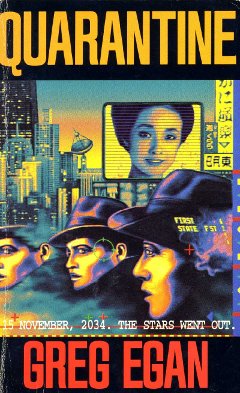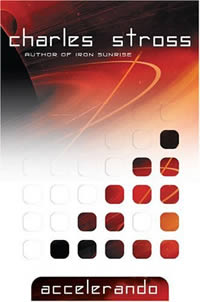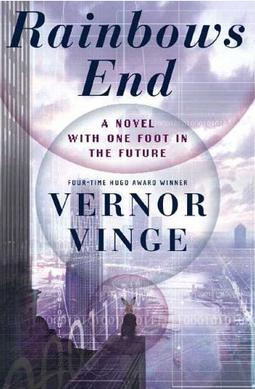Related Research Articles
Greg Egan is an Australian science fiction writer and mathematician, best known for his works of hard science fiction. Egan has won multiple awards including the John W. Campbell Memorial Award, the Hugo Award, and the Locus Award.

Gregory Dale Bear was an American writer and illustrator best known for science fiction. His work covered themes of galactic conflict, parallel universes, consciousness and cultural practices, and accelerated evolution. His last work was the 2021 novel The Unfinished Land. Greg Bear wrote over 50 books in total.

The Hugo Award for Best Novelette is one of the Hugo Awards given each year for science fiction or fantasy stories published or translated into English during the previous calendar year. The novelette award is available for works of fiction of between 7,500 and 17,500 words; awards are also given out in the short story, novella and novel categories. The Hugo Awards have been described as "a fine showcase for speculative fiction" and "the best known literary award for science fiction writing".

Quarantine is a 1992 hard science fiction novel by Greg Egan. Within a detective fiction framework, the novel explores the consequences of the Copenhagen interpretation of quantum mechanics, which Egan acknowledges was chosen more for its entertainment value than for its likelihood of being correct.

Accelerando is a 2005 science fiction novel consisting of a series of interconnected short stories written by British author Charles Stross. As well as normal hardback and paperback editions, it was released as a free e-book under the CC BY-NC-ND license. Accelerando won the Locus Award in 2006, and was nominated for several other awards in 2005 and 2006, including the Hugo, Campbell, Clarke, and British Science Fiction Association Awards.

Rainbows End is a 2006 science fiction novel by Vernor Vinge. It was awarded the 2007 Hugo Award for Best Novel. The book is set in San Diego, California, in 2025, in a variation of the fictional world Vinge explored in his 2002 Hugo-winning novella "Fast Times at Fairmont High" and 2004's "Synthetic Serendipity". Vinge had tentative plans for a sequel, picking up some of the loose threads left at the end of the novel. The many technological advances depicted in the novel suggest that the world is undergoing ever-increasing change, following the technological singularity, a recurring subject in Vinge's fiction and nonfiction writing.
The 57th World Science Fiction Convention (Worldcon), also known as Aussiecon Three, was held on 2–6 September 1999 at the Melbourne Convention and Exhibition Centre in Melbourne, Australia.
"The Planck Dive" is a science fiction novelette by Australian writer Greg Egan, published in 1998.

The Year's Best Science Fiction: Twenty-Fifth Annual Collection is a science fiction anthology edited by Gardner Dozois that was published on July 8, 2008. It is the 25th in The Year's Best Science Fiction series and won the Locus Award for best anthology. The UK edition is titled The Mammoth Book Of Best New SF 21, the "21st Annual Collection" (ISBN 978-1845298289) and contains the same stories listed.
The Ditmar Award has been awarded annually since 1969 at the Australian National Science Fiction Convention to recognise achievement in Australian science fiction and science fiction fandom. The award is similar to the Hugo Award but on a national rather than international scale.

Zendegi is a science fiction novel by Australian author Greg Egan, first published in the United Kingdom by Gollancz in June 2010. It is set in Iran in the near future and deals with mapping the human brain, virtual reality and the democratization of Iran. The title of the book means "life" in Persian; the name of the virtual reality system featured in the story is Zendegi-ye Behtar, Persian for "better life".

Brooke Bolander is an American author of speculative fiction.
"The Diary of the Rose" is a 1976 dystopian science fiction novelette by Ursula K. Le Guin, first published in the Future Power collection. The tale is set in a totalitarian society which uses brainwashing by "electroshocks" to eradicate any kind of political dissent.
Dark Integers and Other Stories is a collection of five science-fiction short stories by Australian writer Greg Egan, published in 2008 by Subterranean Press. One of them, "Oceanic", won the Hugo Award for Best Novella, while two others were nominated.
Crystal Nights and Other Stories is a collection of nine science-fiction short stories by Australian writer Greg Egan, published on 30 September 2009 by Subterranean Press. Two of the stories were nominated for the Hugo Award.
Oceanic is a collection of 12 science fiction short stories by Australian writer Greg Egan, published on 16 July 2009 by Gollancz.
"Luminous" is a science-fiction short story by Australian writer Greg Egan, first published in Asimov’s Science Fiction in September 1995.
"Dark Integers" is a science-fiction short story by Australian writer Greg Egan, first published in Asimov's Science Fiction in October/November 2007. The short story was included in the collections Dark Integers and Other Stories in 2008, Oceanic in 2009 and The Best of Greg Egan in 2020. It was nominated for the Hugo Award for Best Novelette in 2008. It is a sequel to the short story "Luminous".
"Lost Continent" is a science-fiction short story by Australian writer Greg Egan, first published in The Starry Rift edited by Jonathan Strahan in 2008. The short story was included in the collections Crystal Nights and Other Stories in 2009 and Oceanic in 2009. It also appeared in the anthology The Time Traveller’s Almanac edited by Ann VanderMeer and Jeff VanderMeer in 2013.
References
- ↑ ""TAP" by Greg Egan". ISFDB. Retrieved 1 June 2024.
- ↑ 1996 Hugo Awards, at TheHugoAwards.org; retrieved August 21, 2018